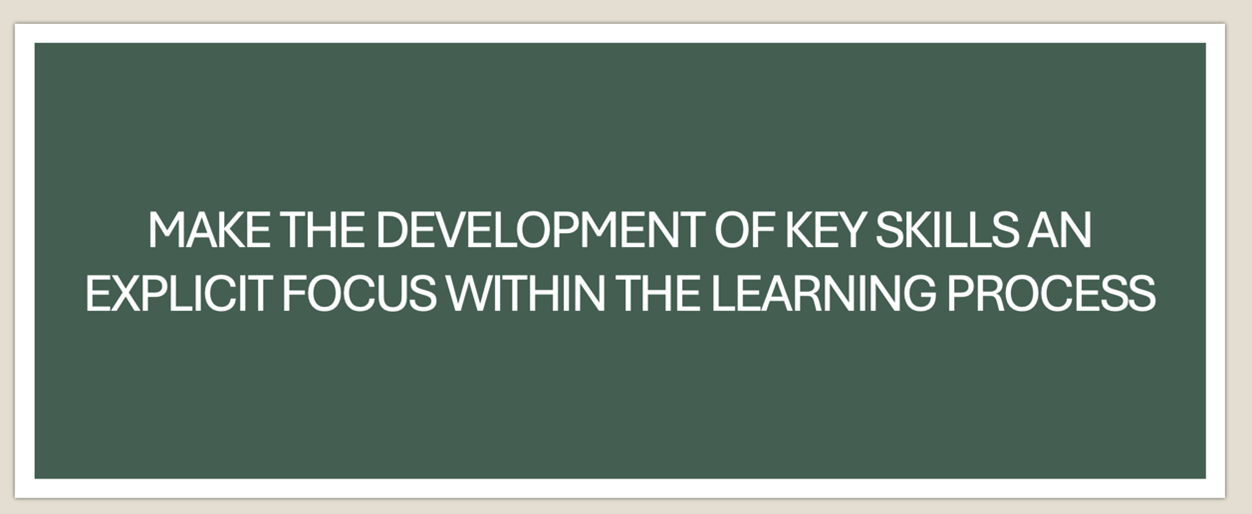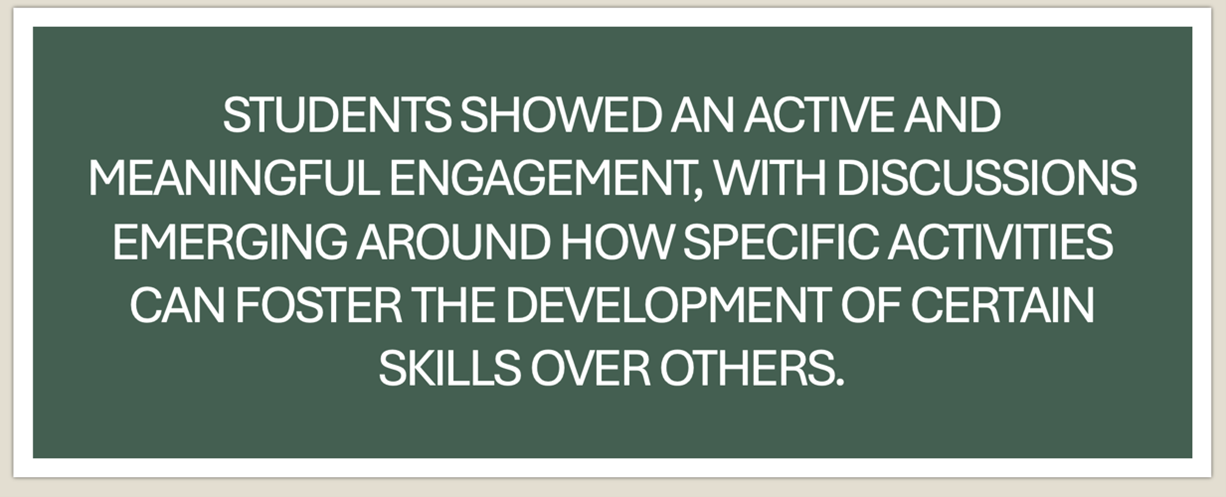
Future-Proof Learning: A curriculum centred on transferable skills
Future-Proof Learning: A curriculum centred on transferable skills
Most STEM programmes require high standards of proficiency in maths at undergraduate level and failure to meet sufficiently high grades in maths is a key reason for students not achieving an undergraduate place.
In response to Exeter’s commitment to Widening Participation, in 2021, the Faculty of Environment, Science and Economy (former CEMPS) launched Exeter’s first Maths Foundation Year programme to ensure that all individuals with the potential to thrive in higher education STEM programmes have equal access and opportunity. In this article I will demonstrate how I have led teh development of a skills-centred maths curriculum (2021 – date) which has widened access to mathematics, engineering Computer and physical sciences for 16 UG degree programmes in a Russell Group University (Exeter). Our evaluation and students’ feedback show that by embedding capacity-building into the learning experience learners are equipped with the skills and confidence necessary to proactively engage in mathematical thinking and self-directed learning.
So how did we develop this programme? Using Exeter’s Access and Participation Plan (2021) findings, I defined three main objectives of the Foundation programme:
- Students are equipped to meet the challenges of the mathematical components confidently.
- Students are resilient learners who make successful transitions to undergraduate studies.
- Improved progression to STEM undergraduate courses and closing gaps in access and retention for WP key groups.
Key Features of this design:
(a) Integrated curriculum & skills design toolkit (e.g. assessments to develop maths autonomy).

- The concept of “Constructive Alignment” was vital for this establishment, particularly in deciding what to include and what to leave out and how to teach to ensure the successful transition of WP learners. This meant paying attention to how modules will feed into one another as pre-requisite or co-requisite using Angelo’s (2012) definition of “within-subject alignment” and “horizontal alignment” of a curriculum design while also ensuring vertical alignment with previous and subsequent stages of the students’ progression.
- Key to this development was to encourage a culture which “promotes desirable learning behaviours” and “maximises opportunities for student learning throughout the assessment process” (Advance HE). I used the “fit-for-purpose” approach by Brown & Race (2012) to articulate assessment strategies according to “context, cohort, level of study and subject area” and to think meaningfully about the type, the frequency and the purpose of each assessment.
- As a result, we introduced a curriculum with a wide ranging assessment methods to add value in terms of student learning (Gibbs & Dunbar-Goddet, 2007) with the rationale that continuous assessments[1], spread the risk and enable students “to learn from feedback to improve the next assignment” (Brown & Race’s, 2012) and also to avoid “Week 7 Blues”[2] which is stressful and risky for students. See Table 1 which cross-references assessments with core transferable skills on each module of the programme.
- To assess and refine the alignment between learning outcomes and course objectives over the three cycles of the programme, we employed an iterative and manageable approach to assessment evaluation by responding to the following questions: “Why am I assessing?”, “How am I assessing?” and “Is the assessment fit for purpose?”. For example, Computer Based Assessments were introduced to build resilience and grit in maths classrooms; Problem Based Learning was adopted to develop skills such as leadership and creativity; report writing was used to enhance analytical and communication skills.
 Table 1: Mapping assessments to key academic and transferrable skills developed in each module.
Table 1: Mapping assessments to key academic and transferrable skills developed in each module.
b)

- Core to this establishment was to create inclusive forums for dialogue between staff and learners that support community development on the programme. For example we employed the “feedback on their feedback” model (Krause, 2012) for the modules on the programme which promoted the value of iterative feedback processes that sustain meaningful dialogue for quality improvement.
- Designed joint office hours and maths-drop-in sessions co-hosted by two academics who teach on the programme, to create a more approachable and supportive environment, encouraging greater student participation. Besides, students had the chance to seek one-to-one support outside those hours.
(c) Initiated and sustained a reflective culture that support continuous learning and improvement.
- At the start of the academic year, students were provided with “Academic and Transferable Skills Audit” for use throughout the year where they had the option to discuss this with their module lecturer(s)/personal tutor and ask for advice. They also had the option to have one audit per module / or one audit for all the modules based on personal preferences.

- The Skills Audit included a wide-ranging list of transferable and academic skills, and the students were encouraged to:
- carry out a self-assessment by giving a score against each skill (1 to 5).
- make a brief note of how they are doing or how they could take action to improve.
- revisit and re-evaluate their progress (weekly/bi-weekly)
The Audit was a living document designed for students’ personal use which they can review throughout the year.

- As part of the curriculum, students engaged with meaningful reflection exercises, which encompassed transparency in dialogue with their lecturers on the skills that they would need to develop. Those opportunities were built based on mutual respect and appreciation.
-
- A dedicated lecture hour was designed at the start of the term to introduce learners to the skills reflection activity; the session was supported by demonstration examples where we provided some examples on “what a reflection can look like” and “how a reflection can be expressed”.
- Throughout the academic term ongoing reference points to the learning activities and the associated skills were made explicit, helping students recognise the connections between the module design and the skills being developed.
- At the end of the term a lecture was dedicated to talk through the reflection activity and evaluate its impact and relevance. Students showed an active and meaningful engagement, with discussions emerging around how specific activities can foster the development of certain skills over others. For the following academic term, a comparable exercise was developed, offering extended opportunities for skills enhancement—particularly in areas such as project work and presentation competencies.
Over the last three cycles of the programme, we engaged with various pedagogical practices to ensure alignment between the objectives and the design of the programme. Regular module evaluation surveys have been very positive scoring an average >4.00 out of 5.00 across the 120 credits of modules in the last two cycles; and students’ progression outcomes are endorsing this establishment. To evaluate the programme as a whole, we also used the “Theory of Change” approach – which encompassed 2 surveys, and a focus-group interview each year to perform an overall analysis of the programme and to measure its current and broader impact. A summary of this evaluation was published in the Success for All Newsletter (2025); The full report will be published in Autumn. Our students noted an impact on their confidence, academic skills and knowledge in mathematics commenting that they feel what they had learned on the programme had prepared them well for their degree, and that without it, they would have struggled. Another student commented: “The foundation year at Exeter stands out among other universities with its organisation and structure”.

References:
Angelo, T. (2012) ‘Designing subjects for learning: practical research-based principles and guidelines’, in L Hunt & D Chalmers (eds), University teaching in focus: a learning-centred approach, ACER Press, Melbourne, pp. 93-111.
Brown, S. & Race, P. (2012) ‘University effective assessment to promote learning’, in L Hunt & D Chalmers (eds), University teaching in focus: a learning-centred approach, ACER Press, Melbourne, pp. 74-91.
Gibbs, G. & Dunbar-Goddet, H. (2007) The effects of programme assessment environments on student learning, Higher Education Academy, York.
Krause, K. (2012) ‘A Quality Approach to University Teaching, in L Hunt & D Chalmers (eds), University teaching in focus: a learning-centred approach, ACER Press, Melbourne, pp. 304-327.
Widening Participation (2020/21) ‘Access and Participation Plan’, University of Exeter. Available at: https://www.exeter.ac.uk/about/vision/wp/#a0 (Accessed 30 May 2025).
[1] Students undertake a number of smaller, separately assessed, tasks.
[2] Giving students no assessed work for some time and then giving multiple assignments with clashing submission dates.
For more information please contact:
This post was written by Dr Houry Melkonian
Senior Lecturer in Mathematics and the Director of STEM Foundation Programmes, University of Exeter.

